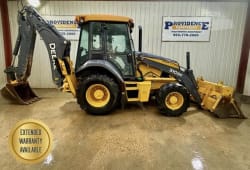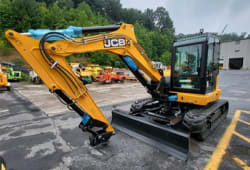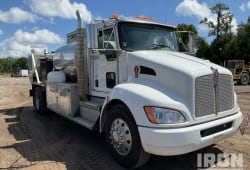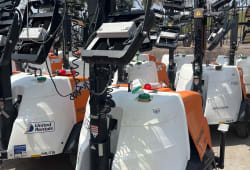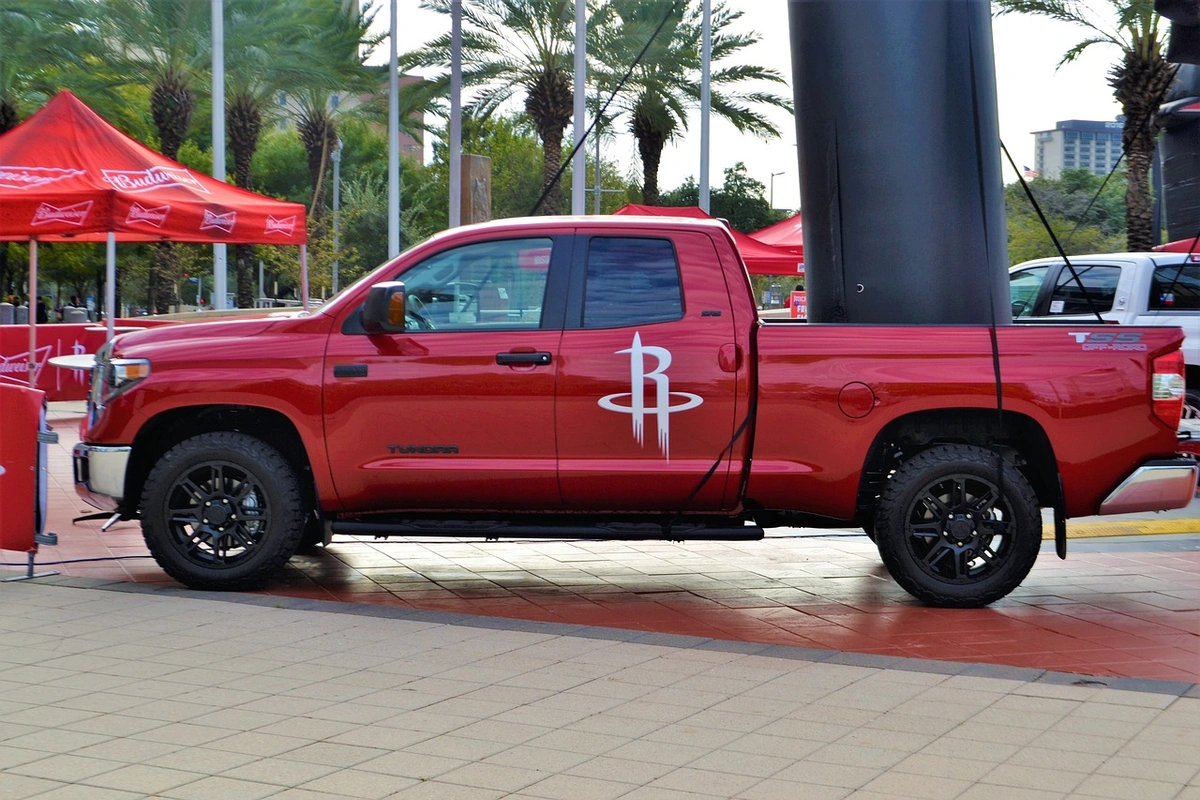A Quick Guide on Used Heavy Equipments
8 Min read
)
October 16, 2023
In the world of heavy equipment, buying used machinery can be a wise and cost-effective decision. However, before embarking on this path, it's essential to have a comprehensive understanding of the process, ensuring that your investment is well-placed and reliable. This quick guide on used cost-effective heavy equipment will serve as a valuable resource for both new and experienced buyers, providing insights into the essential considerations and steps to follow.
Why Choose Used Heavy Equipment?
Opting for used heavy equipment makes economic sense for many businesses and individuals. It allows access to high-quality machinery without the premium price tag associated with new equipment. This cost-effectiveness is particularly attractive for companies looking to expand their fleet or replace aging machinery. Used equipment represents an opportunity to maximize operational capabilities without straining the budget.
Factors to Consider When Buying Used Equipment
When investing in used cost-effective heavy equipment, several critical factors necessitate careful consideration. Foremost among these is the age of the equipment, as it provides significant insights into the machinery's overall condition and expected remaining lifespan. Older equipment may require more frequent maintenance and repairs, impacting its long-term cost-effectiveness.
The usage history of the equipment is another crucial element. Understanding the nature of past projects and the working conditions the machine has endured can shed light on potential wear and tear. A well-maintained machine with a history of light to moderate usage may be a more reliable investment.
Maintenance records: The availability of maintenance records is pivotal. These records provide a detailed account of the machinery's upkeep, including routine service, inspections, and any repairs or replacements. A well-documented heavy equipment maintenance history is a positive indicator of proper care and attention from the previous owner.
Modifications or repairs: Modifications or repairs made to the equipment also warrant scrutiny. If significant alterations or replacements have occurred, it's vital to understand their origin and quality. Genuine replacement parts and professional repairs contribute to the equipment's reliability, while aftermarket components of dubious origin may be cause for concern.
By thoroughly inspecting and evaluating these factors, buyers can make well-informed decisions and navigate the used equipment market with confidence, ultimately ensuring that their investment meets their expectations and operational needs.
Selecting the Right Equipment
Selecting the right used heavy equipment demands a comprehensive understanding of your specific needs and the machine's capabilities. The equipment should align with the demands of your projects in terms of size, power, and functionality. Conduct a detailed assessment of the tasks the machinery will perform to ensure it meets your requirements.
Moreover, consider the availability of attachments and accessories that may enhance the machine's versatility. This adaptability can be invaluable for various applications.
Brand reputation and the manufacturer's track record are also essential. Reliable and reputable manufacturers are more likely to produce durable and high-quality equipment. Investigate the reputation of the brand and seek recommendations from others in the industry to gauge the machine's reliability.
Finally, analyze the machine's overall condition, inspecting key components such as the engine, hydraulics, and undercarriage. Evaluate its maintenance and repair history to gauge its past performance. A well-maintained machine with a sound maintenance record is more likely to be a reliable, cost-effective choice, providing long-term value for your investment.
Researching Reliable Sellers
When you're in the market for used heavy equipment, finding a reliable seller is essential. Extensive research will help you identify reputable sellers who offer quality machinery and transparent dealings.
Start your research by exploring online marketplaces, equipment dealerships, and auction platforms. Look for sellers with positive reviews and a strong track record in the industry. Feedback from previous buyers can provide valuable insights into the seller's reputation. Additionally, consider visiting their physical location or equipment yard to inspect the machinery in person. This hands-on approach allows you to verify the condition of the equipment and assess whether the seller accurately represents it.
Don't forget to verify the seller's credentials and certifications, as these can be indicators of their trustworthiness. Look for associations, affiliations, or industry memberships that demonstrate their commitment to ethical and professional conduct. Building a relationship with a reliable seller is key to securing high-quality used heavy equipment and ensuring a smooth buying process
Equipment Inspection
A thorough heavy equipment inspection is paramount when considering the purchase of used machinery. This process involves an in-depth evaluation of the machine's components and systems to assess its overall condition and performance potential.
Begin with a visual inspection to identify any visible damages, signs of wear, or missing parts. Then, proceed with more comprehensive assessments. Examine the engine, hydraulics, transmission, and undercarriage to check for leaks, rust, or damaged components. Ensure that all critical systems are in good working order.
It's advisable to conduct a test run of the equipment to assess its performance, including its handling, power, and efficiency. Listen for unusual noises and watch for irregularities during operation.
If possible, obtain heavy equipment maintenance and repair records to gain insight into the machine's history. The inspection process should be meticulous and detailed to minimize the risk of unexpected issues after the purchase. In case you lack the expertise to perform this evaluation yourself, consider hiring a professional technician to conduct a comprehensive inspection and provide you with a detailed report. This investment can save you from costly surprises and ensure that the used heavy equipment meets your expectations and requirements.
Evaluating Maintenance Records
The maintenance history of used equipment can provide substantial insights into its reliability and longevity. Buyers should request and thoroughly review heavy equipment maintenance records, looking for signs of proper upkeep and adherence to recommended service schedules. Additionally, understanding the origin of replacement parts or any aftermarket components used in repairs can be instrumental in gauging the equipment's condition.
Understanding Pricing and Budget
When it comes to purchasing used heavy equipment, understanding pricing and budget considerations is crucial. The pricing of such equipment can vary widely based on several factors. These include the machine's age, condition, brand, model, usage history, and any additional attachments or features it may have. Older machines with high usage hours but in good condition may offer cost savings compared to newer models.
It's vital to establish a well-defined budget before you begin your search. Determine the maximum amount you're willing to spend, including the purchase price and any additional expenses like transportation, inspection, and refurbishment if necessary. A clear budget will help you narrow down your options and make informed decisions when negotiating prices. Additionally, research the current market value of the specific equipment you're interested in to ensure that you're getting a fair deal and avoid overpaying for used machinery. Balancing your budget with your equipment requirements is essential for a successful purchase.
Negotiating the Deal
Negotiating the purchase of cost-effective heavy equipment is a crucial step in the buying process. It's often the stage where you can secure a favorable deal and ensure that you get the best value for your investment. To negotiate effectively, begin by thoroughly researching the market prices of the equipment you're interested in. Understanding the current market conditions and typical pricing for similar models will give you a strong position during negotiations.
When you're prepared to make an offer, start with a price that is below your budget but still within a reasonable range. This provides room for negotiation and gives you a better chance of settling on a mutually beneficial price. During negotiations, focus on the condition and heavy equipment maintenance history of the equipment, as well as any necessary repairs or refurbishments. Remember that it's not just about getting the lowest price but ensuring that the machine meets your requirements and comes with all the necessary documentation. Effective communication and a willingness to compromise can help seal the deal, ensuring you acquire the used heavy equipment you need at a fair price.
Finalizing the Transaction
As the purchase process nears completion, it's essential to ensure that all the details are in order. This includes confirming the specifics of the deal, such as warranties, payment methods, and any applicable taxes or fees. A clear understanding of the necessary paperwork and documentation for finalizing the transaction is crucial to successfully transferring ownership of the equipment.
After-sales Support and Training
The purchase of used heavy equipment should ideally involve inquiries about after-sales support and training options. Some sellers offer assistance with equipment operation, maintenance, and troubleshooting, ensuring that the buyer is well-equipped to use the machinery effectively and safely. This valuable support can enhance the overall ownership experience and contribute to the long-term reliability of the equipment.
Conclusion
This comprehensive guide on used of cost-effective heavy equipment underscores the importance of due diligence, informed decision-making, and thoroughness throughout the buying process. The main takeaway is that a well-prepared and educated buyer is better positioned to acquire a reliable, cost-effective machine that aligns with their operational requirements, ultimately contributing to their business's success and efficiency.

Caleb Woods is an experienced content specialist and an editor at Boom & Bucket, blending his journalism background with expertise in the heavy equipment industry. He delivers engaging, informative content to help professionals stay informed and make smarter decisions in the machinery market.
